China Welcomes Progress In Iran-Saudi Arabia Relations
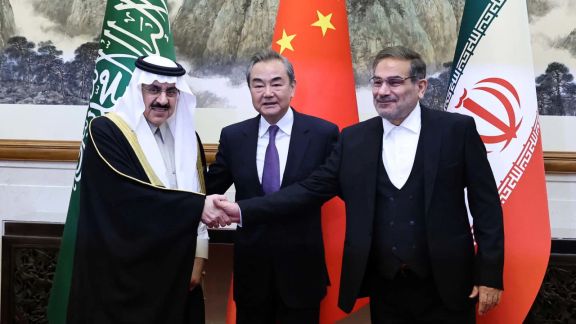
China's Ministry of Foreign Affairs has released a statement highlighting the positive improvement of diplomatic ties between Iran and Saudi Arabia.

China's Ministry of Foreign Affairs has released a statement highlighting the positive improvement of diplomatic ties between Iran and Saudi Arabia.
The statement, released on Monday, referenced a telephone conversation between China's Foreign Minister, Wang Yi, and his Iranian counterpart, Hossein Amir-Abdollahian, discussing the ongoing efforts to foster better relations. Wang Yi underscored China's unwavering support for Tehran's core interests, leading to what he termed a "wave of reconciliation" in the Middle East.
The mediation by China resulted in a notable détente between Iran and Saudi Arabia earlier this year. Wang Yi commended Iran's initiatives in fortifying its relationship with Saudi Arabia, which included a significant meeting between Amir-Abdollahian and Saudi Arabia's Crown Prince Mohammed bin Salman in Jeddah.
"China appreciates the correct decision made by the Iranian side," Minister Wang Yi noted, reaffirming China's steadfast commitment to encouraging diplomacy in the region. He also emphasized the urgency of reinstating the Joint Comprehensive Plan of Action (JCPOA) to comprehensively address the Iranian nuclear issue.
In recent years, Iran's nuclear program has sparked international debates. While Iranian authorities have expressed a willingness to engage with the West, certain elements within Iran have signaled a more assertive stance. A report released in March, suggests that Iran has been producing uranium enriched to 60% purity — a level for which experts say Tehran has no civilian use.
Negotiations to revive the JCPOA commenced in 2022 and have faced several obstacles. Despite international diplomatic efforts, Iran continued to augment its enriched uranium stockpile, raising concerns over its nuclear ambitions and its capability to weaponize nuclear materials.
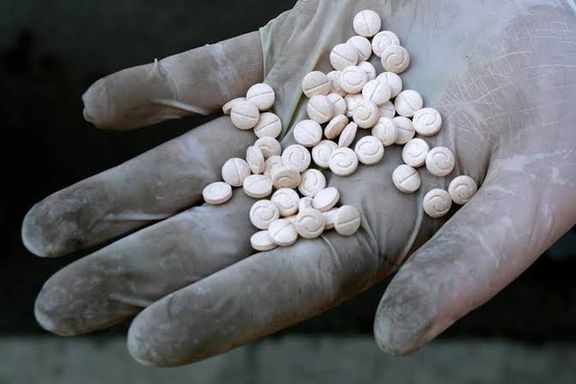
The Former Deputy Chief of Iran's anti-narcotics police has issued a warning about the emerging challenge of increased Captagon abuse nationwide.
In a recent interview with Etemad daily, Mohammad Masoud Zahedian said abuse cases of Captagon, a synthetic amphetamine-type stimulant known by its trademark name, have spiked in recent monthys, since the discovery of an illegal production center in Iraq.
Zahedian expressed the necessity for heightened vigilance in response to this concerning trend, saying that the wave of Captagon consumption has only just begun.
Speaking about the local drug landscape, Zahedian pointed out that while affluent individuals in Tehran are known to consume cocaine, the overall prevalence of cocaine consumption in Iran is limited due to the high associated costs.
He further noted that whilst Captagon consumption is widespread in Arab and African nations, the narcotic is now more widely used in Iran.
Current statistics from 2021 report that Iran has over 12 million drug abusers, with 4.5 million classed as permanent users. Among these, 10% are women and a significant number are children.
Iran, long recognized as a major global conduit for drug trafficking to European markets, allegedly facilitated by the Islamic Revolutionary Guard Corps (IRGC).
One of the key reasons for the Iranian government's opposition to the ratification of Financial Action Task Force (FATF) bills is its reluctance to open itself up to international audit regarding the role of the IRGC in drug trafficking and the potential laundering of illicit proceeds.

South Korea transferred frozen Iranian funds to Switzerland's central bank last week for exchange and transfer to Qatar, South Korean media reported on Monday.
The Swiss National Bank plans to exchange its $6 billion holdings in won for dollars and then euros in the currency market, converting about 300 billion won ($223.85 million) to 400 billion each day for next five weeks, Yonhap Infomax reported, citing an unnamed currency market source.
An official at South Korea's finance ministry declined to confirm the report, citing the legal and diplomatic sensitivity of the matter.
Iran and the United States recently reached an agreement in which five US citizens held hostage in Iran would be released while Iranian assets in South Korea would be unfrozen and sent to an account in Qatar that Iran could access. The Biden administration insists that the funds can only be used by Iran to purchase food, medicine and other humanitarian needs, but the Iranian foreign ministry and officials have insisted there would be no restrictions on the funds.
Iranian President Ebrahim Raisi said last week that the released assets would be used to enhance domestic production.
The deal has led to a lot of criticism in the United States by those who say the $6 billion is essentially a ransom paid for five hostages and it will only encourage Iran and other actors to detain Americans and demand money or concessions. Twenty-six Republican Senators have written to President Joe Biden demanding clarifications. Critics also argue that the money will provide Iran with the ability to spread its terror activities and other malign acts.
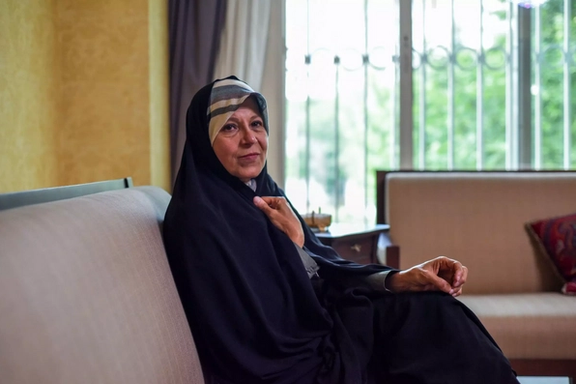
Faezeh Hashemi, the jailed daughter of a former president has written from prison that Iranians have long moved past the reformists and reject the Islamic Republic.
In a letter from prison addressed to a top reformist politician, Hossein Marashi, she criticized him for urging the people to vote in the upcoming March parliamentary elections. "Our weapon is our refusal, and testing the proven is a mistake," Hashemi said referring to a widespread belief in Iran that it matters little which regime faction wins elections. Marashi happens to be Hashemi’s maternal uncle.
In July, Marashi had expressed deep pessimism about regime politicians but nevertheless urged the people to vote. "I have no hope in Iranian politicians. The elites in the society should come forward with determination and make their point, and whatever they need to do. I have hope that the people will change the scene."
He was reacting to an earlier letter from Hashemi urging voters to boycott the elections on the same grounds that all previous elections, whether won by conservatives or reformists did not alter the regime’s core domestic and foreign policies.
Hashemi, daughter of late President Ali Akbar Hashemi Rafsanjani, was arrested in September 2022, days after nationwide anti-regime protests broke out, as the government tried to control the situation by detaining well-known critics and many journalists. She was sentenced to a five-year prison term in January.
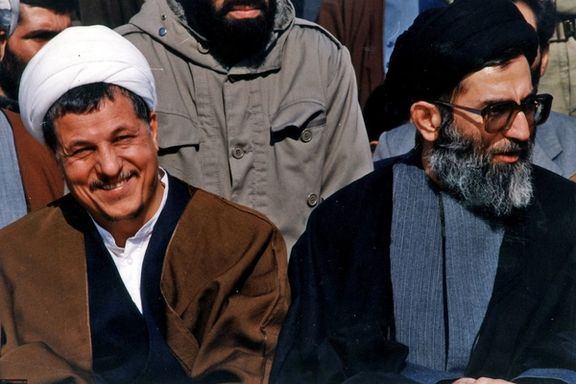
Faezeh’s father was the second most powerful man in the Islamic regime in the 1990s and early 2000s, when he served as president (1989-1997) and held influence and key positions, until Supreme Leader Ali Khamenei gradually pushed him aside. Rafsanjani was the key cleric who helped Khamenei succeed the founder of the Islamic Republic, Ruhollah Khomeini when he died in 1989, although he did not have the required clerical rank and credentials for the post.
Khamenei’s men continued to persecute members of the Hashemi clan, who had become affluent and had legal vulnerabilities that could be exploited by Khamenei’s courts and intelligence services. Faezeh Hashemi who served as a member of parliament, became increasingly estranged from the regime and began defending women’s rights and hurling criticism at the regime that indirectly targeted Khamenei. She was tip-toeing on dangerous ground, and the regime could not take a risk once angry protesters poured into the streets after Mahsa Amini died in hijab police custody last September, and she was jailed.
Hashemi lashed out at the regime in her letter: "Issues like absolute power [of Supreme Leader], the complete dominance of the IRGC in all areas, aggressive foreign policy, the shameful economic situation, lawlessness, deceit and hypocrisy, manipulation, disregard for national interests and public demands, lack of a national perspective, security-driven control over all matters, lack of rationality and strategy in governing the country, extensive and systemic corruption and destruction, severe suppression of any criticism and unjust judicial verdicts, general disillusionment and public hatred of the situation..."
In another part of her letter, Hashemi considered the people's solution to be "engaging in civil disobedience," "ignoring the demands [of officials]," and "increasing pressure and pushing them into a corner."
Hashemi also called her father’s death in January 2017 a “martyrdom”, referring to suspicions that he was killed by regime agents. Rafsanjani died at 82 while enjoying himself in a swimming pool where there were no witnesses. The family called his death “suspicious”but did not take any legal action, which would hardly achieve any results given the total submission of courts and police to the Revolutionary Guard and intelligence agencies ultimately controlled by Khamenei.
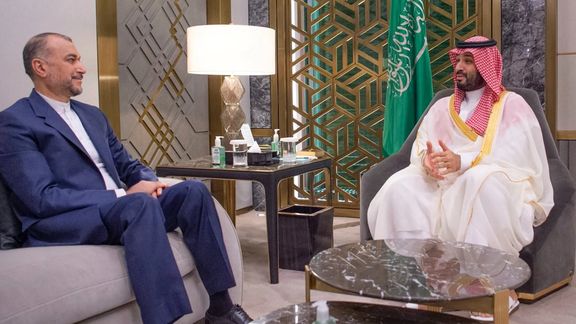
The ongoing détente between Iran and Saudi Arabia has triggered debates in Tehran-based media, with increasing calls for a major shift in foreign policy.
While hardliners are generally cautious, those who favor a change in Theran’s foreign policy toward less confrontation with regional countries and the West, showcase the détente with Riyadh as an example of what needs to be done to save Iran from its current economic crisis.
Writing in the relatively independent website Aftab News, specialist on Arab issues Abolfazl Karimi warned Iran’s hardliners and officials not to underestimate Saudi Crown Prince Mohammed bin Salman. He notes that some regime figures wring their hands waiting for bin Salaman’s grand ideas to fail and perhaps drag Saudi Arabia into chaos and mayhem. However, they should not overlook the Arab prince’s personality and determination to bring change and make the Kingdom a formidable rival to Iran.
Karimi argues that bin Salman has the positive attitude of accepting his weaknesses and limitations. He is also enthusiastic about new technologies and is determined to encourage his country’s youth to take the initiative. His style of governance is also strong with upholding meritocracy instead of the Middle Eastern habit of preferring family and clan ties. He is persistent and follows issues until to their full resolution.
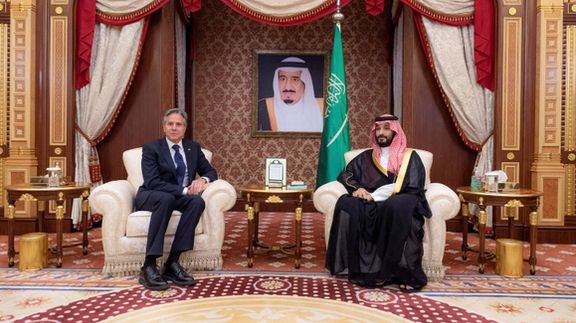
Another relatively independent website, Rouydad24 on Sunday published an article headlined, “Why does the Islamic Republic incur costs for itself in foreign policy?” Blaming the hardliners, the website cited ultraconservative figures in the recent past berating Saudi Arabia and bin-Salman, while now they are speaking softly and with respect, when Iran’s foreign minister visits the kingdom.
Abdolreza Farajirad, a former Iranian ambassador to Hungary and Belgium told Fararu website Sunday that Iran must do its utmost to be a part of bin Salman’s vision in forging a “European Union” in the Middle East. Iran has no choice but to be a part of this trend, with open and region-wide economic ties, cross-investments and trade.
The former diplomat and expert argued that the prospect of full relations between Saudi Arabia and Israel should not impede Iran’s openness toward its Arab neighbors, some of whom have established relations with the Jewish state. Iran is now less sensitive to Muslim countries establishing ties with Israel, unlike in the past when Tehran would react very negatively, Farajirad maintained.
He argued, however, that “Iran must first shake off [US and European] sanctions and embark on a new economic phase” of foreign policy, in order to join a regional coalition of progress and development.
This approach is what many other pundits and even regime politicians have been advocating in the past three years, as US sanctions have evidently crippled Iran’s economy. But few would dare to say openly that resolving the nuclear dispute with the West depends on the will of Iran’s ruler Ali Khamenei.
Farajirad stated his conviction that bilateral diplomatic visit with Arab neighbors is not sufficient to propel Iran into a whole new era of regional relations. He insisted that Tehran must first establish mutual trust with Riyadh, although he did not mention Iran’s confrontational policy in the middle East, given that he was speaking to a media outlet in Tehran.
The Revolutionary Guard have been arming the Houthis in Yemen with sophisticated missiles and drone that they have used to attack Saudi Arabia. Iran has also established an array of Shiite proxy militia forces throughout the region, which Riyadh and its Sunni Arab allies see as Tehran’s plan to dominate the neighboring countries.
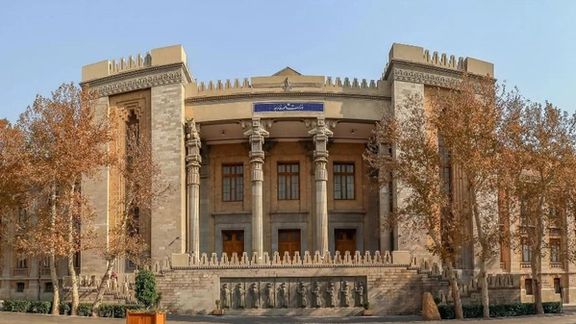
Iran's foreign ministry has summoned the Swedish and Danish charges d'affaires in Tehran to protest the burning and damaging of copies of the Quran in the two countries.
Anti-Islam activists in Denmark and Sweden have burned or damaged several copies of the Muslim holy book in recent months, prompting outrage in the Muslim world and demands that the Nordic governments ban such acts.
Governments in both countries have condemned the burnings and said they are considering new laws aimed at preventing such acts.
"Iran lays the full responsibility and the serious repercussions of the Holy Quran's desecration on the Swedish and Danish governments," state media cited the head of the Iranian Foreign Ministry's human rights department as saying.
The Iranian government has strongly condemned the desecrations and officials have threatened the perpetrators with severe punishment.
Earlier in August, an Iranian born artist shredded a copy the Quran outside the Iranian embassy in the Danish capital Copenhagen
Two other incident involved Salwan Momika, an Iraqi immigrant, who burned the Quran in front of the central mosque in Stockholm on the first day of Eid al-Adha in late June, after obtaining a permit for a demonstration from the Swedish government. He repeated the desecration, this time in front of the Iraqi embassy in Stockholm on July 20.
(With reporting by Reuters)